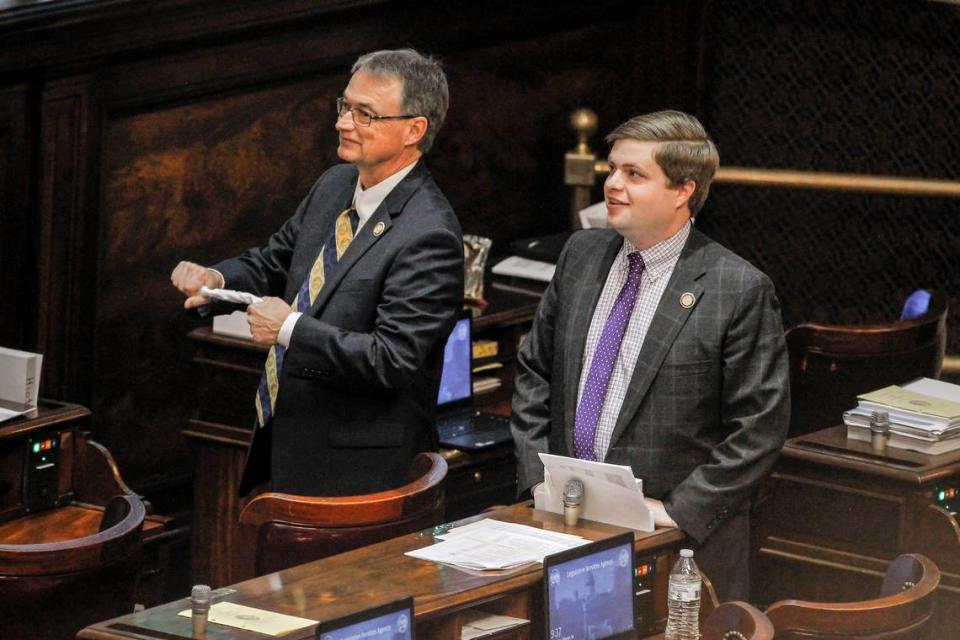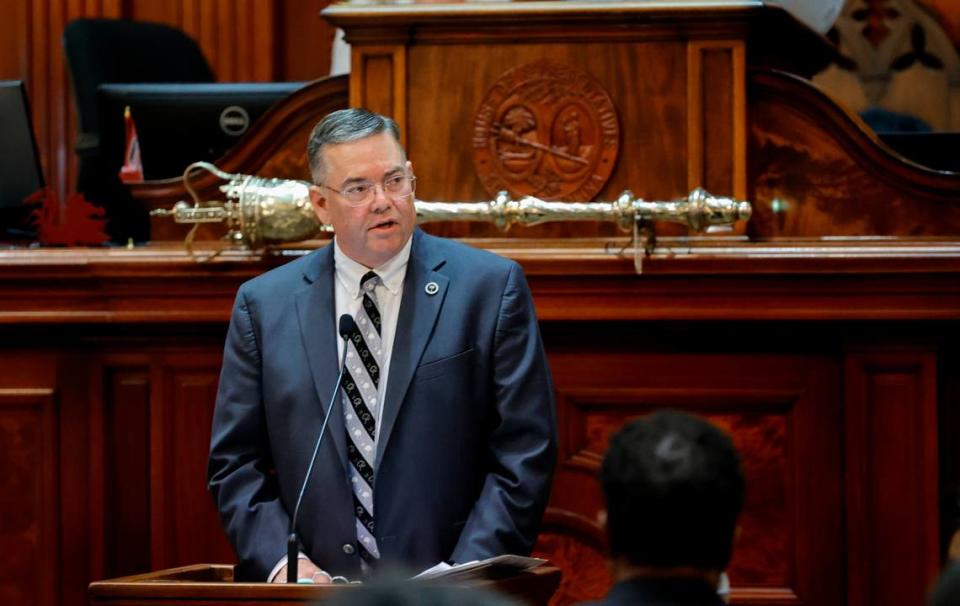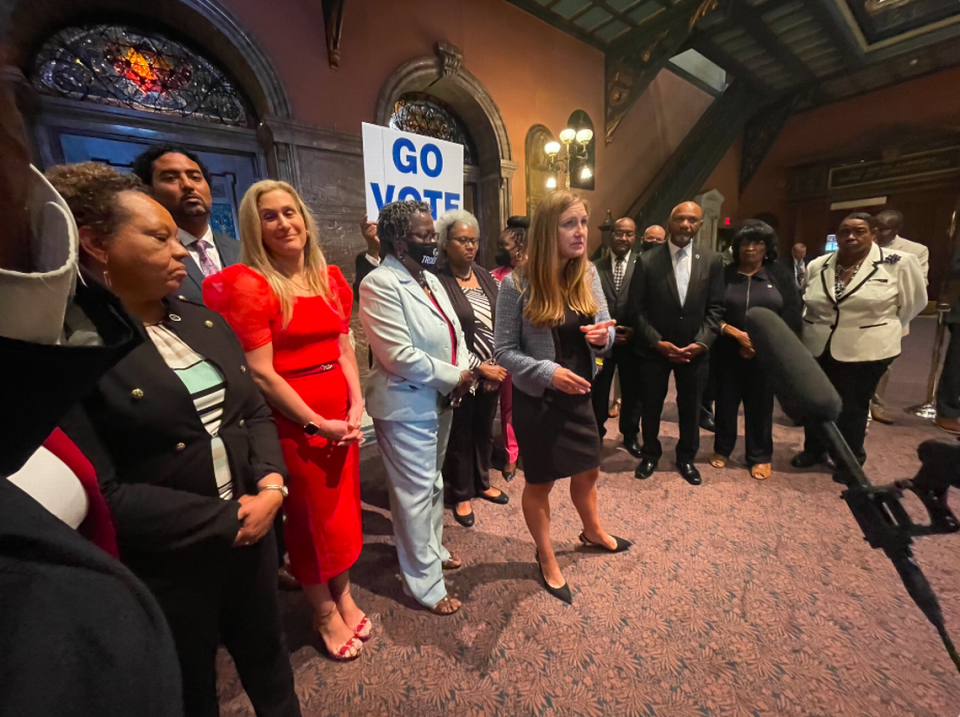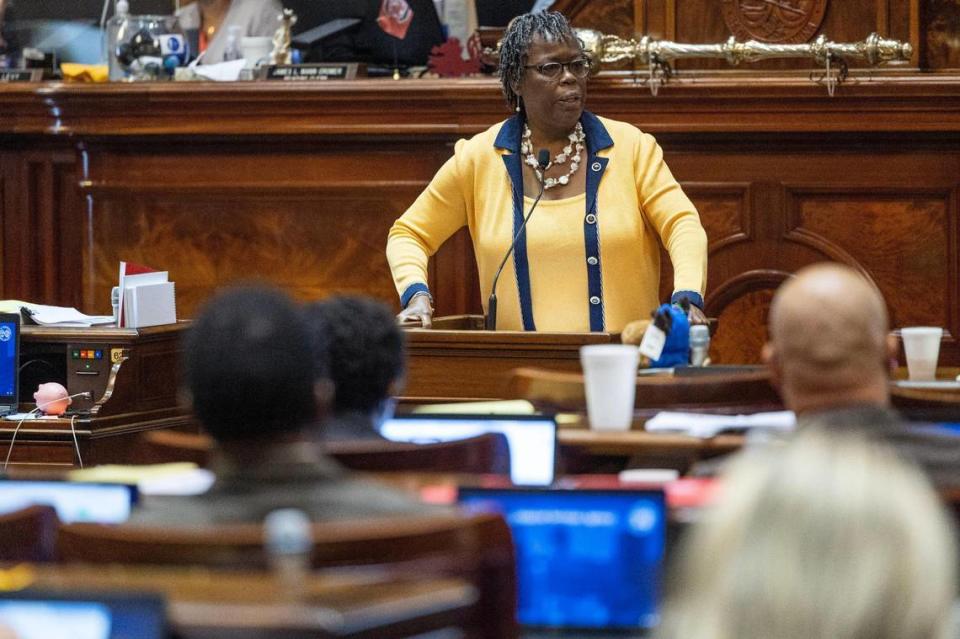You’ll probably never get to vote on abortion in SC. Here’s what’s keeping it off the ballot
South Carolinians may never have a chance at a direct say over whether abortion access should be protected in the state.
Since the overturn of Roe v. Wade, six states – California, Kansas, Kentucky, Michigan, Vermont and Ohio – have voted on abortion-related constitutional amendments. Each time the side favoring abortion access won.
South Carolina doesn’t have a mechanism to allow citizen-initiative petitions to put a question on the ballot.
In a state where a plurality of people oppose the state’s 6-week abortion ban, only lawmakers can place constitutional questions on ballots and Republican leadership doesn’t think that move is necessary because legislators are elected to make those decisions.
Political parties can put advisory questions on their primary ballots, but Democrats philosophically have avoided conducting those polls in their primaries.
The state bans abortions after a fetal heartbeat can be detected, which is usually at the six-week mark and when a woman might not even know she’s pregnant.
The state’s law includes exceptions of up to 12 weeks if the pregnancy is the result of rape or incest. It also allows abortions if the baby has a fatal fetal anomaly and to preserve the life of the mother.
The law was passed in 2023 by a Republican-controlled General Assembly and eventually upheld by the state Supreme Court.

The only way voters in South Carolina would ever vote in a binding resolution about whether abortion should be protected is if two-thirds of each chamber of the General Assembly voted to place a constitutional amendment on the ballot. With the both chambers in the firm hands of the GOP, the odds of that happening are very low.
During the abortion debate in the Legislature in 2023, and during a debate this year over a proposed constitutional amendment that will be on the ballot in November, lawmakers in favor of abortion access tried to place a referendum on the ballot. Their efforts were rejected.
If lawmakers wanted to place a referendum on the ballot, the question has to pose a specific position, like “must the constitution be amended to provide for a right to bodily autonomy that includes a right to an abortion?”
That could be a difficult vote for a lawmaker because voting “yes” for the question to appear could be interpreted as supporting abortion access.
“We have to take an affirmative position that it should be an amendment to the constitution, and the voters are just affirming what we do,” said state Rep. Brandon Newton, R-Lancaster, who serves as a Republican Party whip in the state House.
Newton, along with other Republican leaders, say lawmakers are elected to handle these types of questions.
“The voters vote for their representatives. We vote on the issue and if the voters don’t like how we vote, then that’s how they have a say on the issue. We’re a representative form of government and as long as voters elect the people who make the decisions, I think that’s the voters having a say on the issue,” Newton said.

House Majority Leader Davey Hiott, R-Pickens, said constituents share their opinions with elected officials who share those views in the State House during debates and subsequent votes, which can go deep into the night.
“The United States Supreme Court ruled on it, the South Carolina Supreme Court has ruled on it,” Hiott said. “We know where we are as a General Assembly. We know what will go through the Supreme Court. And I believe once we have got those rulings from the federal Supreme Court in the state Supreme Court, I think the body in here knows what what the parameters are.”
State Rep. John McCravy, R-Greenwood, who leads House Family Caucus, was blunt about the chances voters would have a direct say on abortion access.
“South Carolina does not have a method for a referendum,” McCravy said. “You can get a constitutional amendment on the ballot with two-thirds of the General Assembly. It’s not going to happen, so that’s the end of it.”

Plurality disagree with 6-week ban
Placing a question on the ballot could lead to a result anti-abortion lawmakers disagree with.
A recent Winthrop University poll of 1,174 South Carolinians found a plurality of people oppose the state’s 6-week abortion ban.
According to a Winthrop University poll released in June, 48% of respondents opposed the state’s six-week abortion ban and only 31% supported it.
Support for abortion access in South Carolina also increases when asking respondents about exceptions.
▪ 60% support legal abortion if the baby is likely to be born with severe disabilities or health problems.
▪ 81% support abortion if the pregnancy is the result of rape.
▪ 84% believe women should be able to have an abortion if the pregnancy threatens the woman’s life or health.
With more people supporting abortion access than not, there would be a risk of a similar results as other states who held abortion referendum.
Voters in red states such as Kansas, Kentucky and Ohio have been in favor of protecting abortion access.
“I think it would be like Ohio, like Kansas, and that’s why they won’t do it. I don’t think they would like the outcome... they’re afraid of what the people would have to say,” said state Sen. Katrina Shealy, R-Lexington, who stood against an abortion ban and subsequently lost a primary challenge in June.
Republican leadership in the upper chamber also do not appear to be itching to place the question on the ballot.
“We’re charged as a representative form of government to make those tough decisions, so we’ll let the legislative process work,” said Senate President Thomas Alexander. “The legislature has spoken on that and represents the people from that aspect.”
Lawmakers have placed questions on the ballot in recent history.
In November, South Carolina voters will decide whether to amend the state constitution to say “only” U.S. citizens can vote in elections as opposed to “every” U.S. citizen. In 2022, voters approved increasing how much money state had to keep in rainy day accounts. In 2006, South Carolina voters approved a constitutional amendment to ban same-sex marriage. That provision is no longer being enforced after the U.S. Supreme Court ruled same-sex couples had the right to marry.
State Rep. Spencer Wetmore, D-Charleston, points out abortion access was once thought to be protected by the U.S. and state constitutions.
“We govern as a representative democracy within the bounds our our state constitution. And our state constitution is and should be a document that represents the will of the people. Those are the guardrails that then enable us to govern as a representative democracy,” Wetmore said. “Where we have an issue like (abortion), providing guardrails that should go the people. They should be able to have a voice as to what the constitution says and what those guard rails are for our government.”

Abortion rights proponents have steep hill
South Carolina is a ruby red state. It voted for Trump in 2016 and 2020, elected Republicans to all statewide offices in 2022, and both chambers in the state legislature are overwhelmingly controlled by the GOP.
Going into the 2023 legislative session Republicans held an 88-36 majority in the House and held 30 of the 46 seats in the Senate. The GOP used that advantage to push through the current six-week abortion ban.
Democratic lawmakers say a voter referendum on the issue is the only way to truly see how voters in the state feel about the issue.
“Because of gerrymandering, a true picture of what South Carolinians think can only be gained at the ballot box by allowing everybody to vote,” said state Rep. Gilda Cobb-Hunter, D-Orangeburg. “The state Legislature is not representative of the opinions of the majority of South Carolinians on this issue.”

Hiott would not go as far as saying South Carolinians will never see an abortion question on the ballot, but conceded the makeup of the General Assembly would have to change.
“I don’t believe there’s a consensus or overwhelming majority of the body that wants to put it on as a binding referendum,” Hiott said. “It would be (a) very hard to climb in makeup of the body right now.”
South Carolinians could see a question on the ballot if one of the major political parties opted to ask voters as an advisory question during a primary election. The results of the question, however, would be nonbinding.
The state Republican Party in the last four primary cycles has placed a question about people being allowed to register to vote by political party. In those GOP primaries, between 72% and 86% of voters said “yes.”
The GOP also had questions about judicial reform and tort reform on its 2024 presidential primary ballot.
The S.C. Democratic Party, however, has chosen not to put advisory questions on its ballots.
State Democratic Party Executive Director Jay Parmley said the party has had internal discussion about placing an advisory question on its primary ballots, but the party has not pulled the trigger.
“We have a difference of opinion on advisory questions than Republicans. We’re always concerned about it confusing voters,” Parmley said.
Parmley fears raising voters’ hopes. If they saw an advisory question on the ballot, they might think they were voting on a question that had the full force of law. He also expects that an advisory question on the Democratic ballot wouldn’t reveal anything new. It would show Democrats support abortion access.
“I could tell you that without doing an advisory opinion on the Democratic side,” Parmley said.
It also didn’t happen this year because South Carolina didn’t have a statewide race on the ballot in the June primaries and not all congressional districts had competitive primaries.
“Yes, it’s a rallying cry, but we also talked through does it make more sense if we’re going to do it, put it on a ballot where everyone in the state does have a race,” Parmley said.
Parmley has worked in states where residents can petition to place in a question on the ballot, which doesn’t exist in South Carolina.
“It’s a great tool whenever you can’t get the Legislature to move when you know the people are squarely on a different side,” Parmley said.
Parmley is confident if a binding question ever was put in front of voters, abortion access would be supported.
“You just know, if the voters of this state had a real opportunity to vote on it, we would protect abortion access. We know it,” Parmley said. “One of the ways we know it, you don’t even need a poll, is you need to see how absolutely hardcore the other side is. They know it. They know they’ll lose. That’s why they dig in.”

Not all Republicans are against the idea of putting the question in front of voters.
State Rep. Ashley Trantham, R-Greenville, who won’t return to the State House next year, said a question could be used to further restrict abortion in the state.
She would support a referendum to ban abortion completely.
“I ran on being a pro-life legislator. That’s one reason (people) voted for me, to protect life,” Trantham said. “(The ballot question) would have to be worded very clear, and do a great job educating people going to the polls, because there are things on the ballot that some people had no idea what it was, what it meant or what they were voting for. Then later they say, ‘I hope I voted right.’”
One Republican lawmaker is confident voters would support the anti-abortion position.
“I believe the people of South Carolina believe like we do that abortion should be limited,” said state Rep. Bill Hager, R-Hampton. “I’m not afraid to put it before the people. A lot of folks are because they’re scared it will go the other way, but I trust the people, the people I know would say no. We’re still an anti-abortion state.”
Reporters Javon Harris, Bristow Marchant and Anna Wilder contributed to this article.


